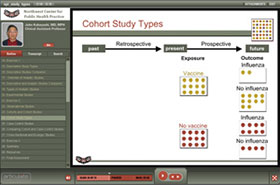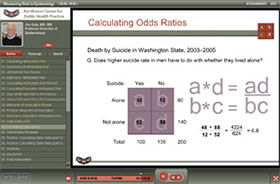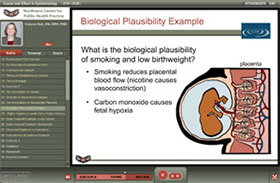Description
West Nile virus! Beef recalls! Contaminated spinach! We live in an age where disease outbreaks are commonplace. This one-hour online course outlines specific steps to take in determining if you have an outbreak on your hands, who should be involved in the investigation, the science behind it all, and how to communicate your findings to the public via the media. This is part of a nine-part series on epidemiology.
Learning Objectives
After completing this course, you should be able to:
- Recognize indicators of a potential disease outbreak
- Describe the steps in conducting an outbreak investigation
- Identify key communication considerations during outbreak investigations
- Understand public health actions that may result from outbreak investigations
Intended Audience
Frontline public health practitioners who need to understand the components of an outbreak investigation or who might be called upon to assist in an outbreak investigation. This course may also be useful for healthcare providers in private practice, laboratorians, emergency response and bioterrorism preparedness planners who need to understand what an outbreak investigation consists of and who is typically involved.
Epidemiology Series
What Is Epidemiology in Public Health?
Data Interpretation for Public Health Professionals
Basic Infectious Disease Concepts in Epidemiology
Introduction to Public Health Surveillance
Introduction to Outbreak Investigation
Measuring Risk in Epidemiology
Cause and Effect in Epidemiology
Screening in Public Health Practice
Prerequisites
Participants should have a basic familiarity with epidemiology terms and infectious disease epidemiology concepts, including a basic understanding of the following concepts: incubation period; exposure; disease transmission; attack rate; cases and controls; agent, environment, and host. We recommend that those who are not familiar with these concepts first complete the Basic Infectious Disease Concepts in Epidemiology course.
Format
Web-based, Flash presentation. This online course has an audio narration and interactive exercises and scenarios. This course should take about one hour to complete.
Course Instructor
Jeff Duchin, MD
Chief, Communicable Disease Control, Epidemiology and Immunization Section, Public Health - Seattle & King County
Associate Professor, Division of Infectious Diseases, School of Medicine
Adjunct Associate Professor, University of Washington School of Public Health
Faculty, Northwest Center for Public Health Practice
Technical Requirements
This course requires certain software and browser plugins to be installed. See our Technical Requirements.
Accessibility
This online training course is audio narrated. A print version is available in the Supplemental Material section at the bottom of this page. Please note that the print version does not include interactive exercises, quizzes, or the final assessment. To receive a print version of the quizzes in this course, or if you have any difficulties, please contact nwcphp@u.washington.edu.



